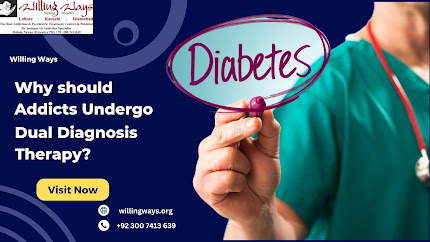How to prevent relapses
Someone with schizophrenia can be frightened by
the prospect that they may relapse, but relapse prevention is not a spectator
sport. Suppose someone goes to a drug rehabilitation
center in Islamabad for better treatment from addiction treatment
specialists, becomes noncompliant, and stops taking their medication. In that
case, relapse can be quite sudden, even if not immediate. If someone takes
their medication as prescribed, they can still relapse, but the process seems
to be a little slower. I have noticed that someone with schizophrenia who is
willing and able to realize they have the illness usually has plenty of warning
of an impending relapse as long as they take their medication. People should go
to the quality of work and Schizophrenia
Recovery and Quality of Work. Although they must understand the
illness's form, they can recognize emerging symptoms. One has to separate one's
disease from one's identity and manage the condition's biology. Everyone has
their own unique early warning signs of relapse. For me, it is a dramatic
increase in ideas of reference. Someone is communicating with me through
messages that only I can understand. Tibetans start controlling
my dreams, observing and judging me. I have trouble falling asleep at night
because my mind is agitated.
My psychiatrist suggested I take 5mg of
Stellazine when symptoms became obvious and look at what stresses and
responsibilities were demanding too much from me. Stellazine tends to knock me
out, and I start sleeping better immediately. After a week, the emergent
symptoms have always faded. For me, an extended period of isolation, the stress
of increased responsibility, or losing a friend can make positive signs much
more real. They never disappear entirely in the first place, but they are mostly in the distant background. When they come to the foreground,
they can be seductive or overpowering.
Case managers are very familiar with this
occasional need for extra medication by the individual with schizophrenia.
People want to know how
to get rid from schizophrenia Often, they notice a
deterioration and try to prevent rehospitalization by getting this PRN
medication to the individual in time. Ideally, you want to empower the
individual to manage the biology of their illness like someone with diabetes
works their condition. Without insight, other people have to, with and without
cooperation from the individual. Without control of the biology of the disease,
people end up in hospitals, in jail, or homeless on the street. Their
deteriorating course is a tragic and expensive loss to the individual, their
families, and society.
In the research that's been done, the two most
important factors that reduce relapse rates are medication and family
education. People stop taking their medication when they are feeling better,
not wanting to believe they have schizophrenia and relapse. Family members are
often the main caregivers, but I'm not sure why family education is so
effective in preventing relapse. It is, though, in several different studies.
There are some other considerations to consider
in preventing relapse. A major one is substance abuse. Someone on medication
for schizophrenia should refrain from any alcohol or illegal drugs. It is just
asking for trouble. Even if an individual drinks or takes drugs, they can
continue taking their medication.
One also has to look at the
"structure" people live in. When I was in the hospital, I felt safe
and started eating three meals daily. I had a comfortable bed and a routine. My
positive symptoms faded as I sobered up in that environment without taking any
medication. I feel better having a nice place to live and money to spend.
Having something to do that's meaningful and being able to accomplish something
all contribute to a sense of well being, I think, fewer symptoms of
schizophrenia.




Comments
Post a Comment